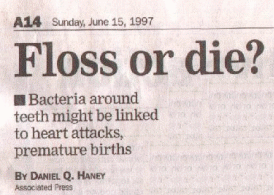There is now a line of evidence suggesting that oral bacteria – should they find their way into the blood stream – may result in someone having a stroke. http://abcn.ws/sc6Bcs
 We do know that bacteria that live normally in the mouth often can be sampled in the blood stream. We also know that dental infections, should they not be treated early, can lead to terrible problems including death should bacteria cause a blood stream infection known as a “septicemia.” http://wapo.st/vRcX4n
We do know that bacteria that live normally in the mouth often can be sampled in the blood stream. We also know that dental infections, should they not be treated early, can lead to terrible problems including death should bacteria cause a blood stream infection known as a “septicemia.” http://wapo.st/vRcX4n
But what really are the chances that chronic gingivitis, periodontal disease or infections as a result of decaying teeth will be the primary factor for someone having a stroke? Nobody knows. We also don’t know if there is a threshold number of bacteria that puts someone at greater risk for stroke. You see, even the healthiest mouth contains a lot of bacteria.
I also wonder if knowing this kind information changes behavior? Do people decide to floss or not based on the concern about death from stroke or heart disease? And let’s face it, flossing once or once in a while because of things we read in the news isn’t likely to significantly lower death from strokes or heart disease in the general population.
What keeps people healthy in life and possibly reduces the risk that any oral problem will result in an earlier than expected death is a life-long pattern of healthy living that includes good oral care and regular dental check-ups. For this we need parents who work with their children to create life-long good habits by insisting (ok – nagging) that they brush their teeth. These parents also demonstrate healthy behavior the children can see and they actively brush their children’s teeth up to an age where kids can demonstrate they can do it effectively on their own.
So let me ask you, how did you learn to value your oral health? Why do you floss your teeth (or not)?
